 |
 |
New Games for Old Systems |
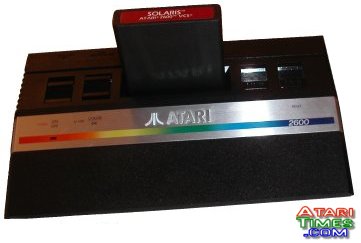 So why would someone go to all the effort needed to program and ultimately manufacture more new games for these dead systems? Especially considering the small fan base?
So why would someone go to all the effort needed to program and ultimately manufacture more new games for these dead systems? Especially considering the small fan base?
Whether it is simple hack or an entirely new homebrew game there will always be many challenges. There is a lot of tinkering time and learning that must be invested. Countless hours of coding, play testing, and the dreaded debugging. Should I try to sell my creation? If so, you'll need to learn about and/or acquire tools, parts, capital investment, soldering skills, system specifications, circuit design, integrating components, testing, manufacturing, inspection, inventory, marketing, sales, customer complaints, packaging, artwork, shipping, handling, and we better mention manufacturing again - weeks of work there. We're all in this hobby together and we want to see it grow and give us the chance to play new games. Likewise we'd all like to play games that were unreleased, prototypes, or lost games once they are discovered.
Ron Corcoran, the Twin Galaxies chief editor and Atari referee has done some hacks himself. Ron notes that once you understand where/how graphics are stored in a VCS game, it's a simple matter to change them. There is a great 5 page paper entitled "Changing Atari VCS Graphics the Easy Way" by Adam Trionfo on the www.gooddealgames.com website. Efforts like these by Adam can make us all proud to be classic garners.
Better game concepts, gameplay, play testing, game options, sound and graphics, re-playability, packaging, instruction manuals, artwork, boxes and more have greatly improved the average new game's overall completeness. Ultimately, this has lead to many more hobbyists than ever before to jump on the homebrew bandwagon. They know that they can succeed if they try hard enough and won't give up.
Of these new games for our classic consoles there are basically two types and a few subsets of each. Games are either 1) original games coded back in the classic 8-bit era, plus pirated copies of them, or 2) completely new and original games, most often called homebrews.
Prior to hobbyists today, some companies, mostly in overseas (non-USA) markets took licensed games and changed their looks by hacking the graphics and maybe the gameplay too. They'd repackage the game and usually sell it for less than the original. The buyers may not have been happy with the quality, and the original copyright owners were cheated out of earnings, but most occurred after the US market had already crashed in 1984.
Today, only the best of those games that are hacks by hobbyists become cartridges. Anyone who has made a decent hack deserves some credit for their efforts and hopefully the knowledge gained has helped them towards making an original homebrew.
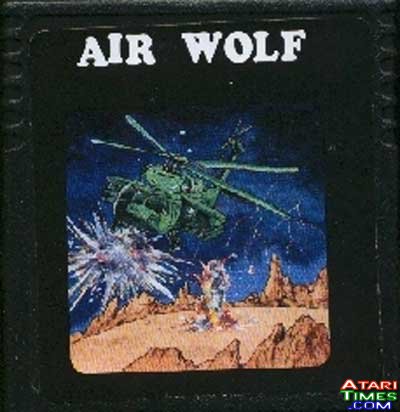 Just like the 1980's hacks, some overseas companies simply took the code as is and ripped it off and resold it. Today, for as little as $16 (maybe less now) you can have a cartridge made that is a copy of any one game
provided the ROM image is available) for the Atari 2600 and other systems. In most cases this is not legal, but since many classic games were produced in such small quantities, their scarcity drives the price up making the original game unobtainable.
Just like the 1980's hacks, some overseas companies simply took the code as is and ripped it off and resold it. Today, for as little as $16 (maybe less now) you can have a cartridge made that is a copy of any one game
provided the ROM image is available) for the Atari 2600 and other systems. In most cases this is not legal, but since many classic games were produced in such small quantities, their scarcity drives the price up making the original game unobtainable.
Pirate or copied carts are often brand new, or very clean cartridges, but still only a copy. Good for gaming purposes, but not much in terms of collectible value - only worth what you paid for it. Be forewarned to make sure that any expensive game you buy is not a pirate cart. Q*bert's Qubes is a good example of a game that often shows up on Ebay by greedy sellers, or second hand sellers who were burned in the first place.
Some games from the 80's were completed, or almost completed, but never released. Most of these have been found and are at least in ROM format, if not available as carts now. Often these are very good games to play - mostly those from just before the crash.
Everyone who loves them will go nuts wanting to play them for the first time. There will continue to be some hold outs where only one prototype of a game is around and the owner will not share it in any way. It may be a great game, partially done, or even a lemon, but we'll never know.
Then there are some extreme cases where the actual programmer is willing to help make his or her creation available to us. In 2002 I met Bob Polaro (author of 2600 Defender, Rampage, Desert Falcon, RealSports Volleyball and several others) who recently helped to release in limited quantities games that he wrote, Bugs Bunny and Holey Moley. Although the price was a bit high, the quality was there. Knowing that some of your money was going back to the programmer who deserves to have it, made it worth the higher price. One of the first such programmers to share his unreleased game was back in 1993-94 when Rob Fulop made and sold approximately 60 copies of his game Cubiclor, which Imagic had rejected back in 1982. These cartridges were numbered and autographed by him. Kudos to Rob for helping to pave the way.
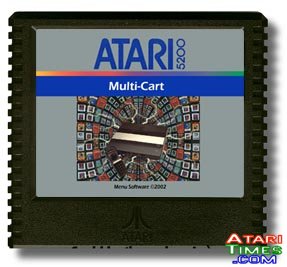 Often pirated compilations like these can be found to have every game ever made for a home console, or at least a large number of them. These are great for the game player, but not so much the collector. Sometimes they offer bizarre hacks and homebrews, but most contain rarer games from the original system library. The price is steep, but fair considering all that you can play.
Often pirated compilations like these can be found to have every game ever made for a home console, or at least a large number of them. These are great for the game player, but not so much the collector. Sometimes they offer bizarre hacks and homebrews, but most contain rarer games from the original system library. The price is steep, but fair considering all that you can play.
Probably all multicarts save the Vectrex should be considered piracy. The original Vectrex games being the exception once they were released into the public domain.
The owners of the Colecovision copyrights have prevented sales of an unlicensed Colecovision multi-cart that is reported to be quite a treat for the scant few that have one. Why won't the copyright holders work with us? I'd bet that such multi-carts could be made and sold in great numbers even if the price was increased $100 Then give that money to its rightful owners.
Most new games that are not hacks of existing ones are pretty much new homebrew games. These will continue and be better and better all the time as the expertise and knowledge continues to be shared and passed on - making it easier to program a quality game.
There are even hacked versions of homebrews. You know that your homebrew must be good, or at least had potential, if it gets hacked by someone else and then resold as another version of your game. Hopefully, all of these had the original owner's permission.
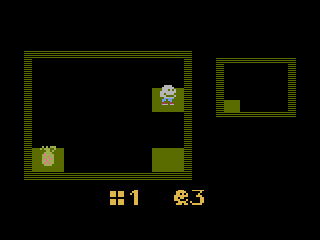 Yet another subset of "new" games that is picking up some speed are ports of classics now made for the first time on some systems.
Amok! Is an example of a quality arcade game, Berzerk now made for the Odyssey 2. Another good example for the Atari 2600 is Thrust, a port of a game originally found on the C64.
Yet another subset of "new" games that is picking up some speed are ports of classics now made for the first time on some systems.
Amok! Is an example of a quality arcade game, Berzerk now made for the Odyssey 2. Another good example for the Atari 2600 is Thrust, a port of a game originally found on the C64.
All you need is the passion to fill the holes where they exist. I'm sure that someone else will agree and want the game to play as well, but only if the system is capable of having a decent version of that game.
Non-Classic Remakes Yet another subset of "new" games are those that are not classics, but from the Bit Age (NES through 32-bit) or even the PC brought back onto our classic platforms. 2600 Edtris a Tetris game and CV Bejeweled are great examples bringing newer games into the past.
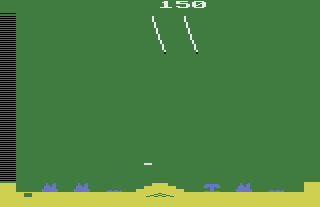 There are now some interesting variations on hacks that are noteworthy. Thomas Jentzsch has made a modified version of the original 2600
Missile Command that takes full advantage of the track ball mode. Sure, you can use a track ball to play the original version, but it is really working in the joystick mode. Testimonials are that this is really worth having if you love the arcade or 5200 track ball versions. Likewise there are at least two games that have added background music to some original classics. 2600
Berzerk voice enhanced now has more correct graphics and colors. Likewise
Combat Rock plays "Rock the Casbah" while you play the original Combat. On the Vectrex, there are several titles that have been reworked to play using a 2600 driving controller. This adds a lot more potential to the Vectrex library. Hopefully this enhancement will catch on and programmers will have options to use either the regular controller or the Atari driving controller in the next round of new Vectrex games.
There are now some interesting variations on hacks that are noteworthy. Thomas Jentzsch has made a modified version of the original 2600
Missile Command that takes full advantage of the track ball mode. Sure, you can use a track ball to play the original version, but it is really working in the joystick mode. Testimonials are that this is really worth having if you love the arcade or 5200 track ball versions. Likewise there are at least two games that have added background music to some original classics. 2600
Berzerk voice enhanced now has more correct graphics and colors. Likewise
Combat Rock plays "Rock the Casbah" while you play the original Combat. On the Vectrex, there are several titles that have been reworked to play using a 2600 driving controller. This adds a lot more potential to the Vectrex library. Hopefully this enhancement will catch on and programmers will have options to use either the regular controller or the Atari driving controller in the next round of new Vectrex games.
 Back in the 80's, the Starpath Supercharger allowed for added memory in the games, including multiloads. Today this same hardware can be used to load the ROM images for many of the 2600 games. With some inexpensive hardware modifications to the Supercharger, a significant portion of the 2600 library can be played. Many fans highly recommend the "Worship the Woodgrain" CD compilation, which is played from a CD player to the Supercharger.
Back in the 80's, the Starpath Supercharger allowed for added memory in the games, including multiloads. Today this same hardware can be used to load the ROM images for many of the 2600 games. With some inexpensive hardware modifications to the Supercharger, a significant portion of the 2600 library can be played. Many fans highly recommend the "Worship the Woodgrain" CD compilation, which is played from a CD player to the Supercharger.
In 2001, a further enhancement was made, by expanding upon what the Supercharger did. This enhancement known as the Cuttle Cart which allows for practically every 2600 games to be played.
Even though not released on cart or as yet for formats that can be played on the actual hardware, the Intellivision Blue Sky Rangers (former programmers and employees of Mattel and INTV) have found a way to bring nearly all of the Intellivision games (and some new, unreleased ones) back to the masses, via emulation on the PC. They have CD's packed with nearly all the games in the Intellivision library as well as large amounts of graphics and tidbits about all their games made by Mattel, various third party companies and later INTV. This also includes information on games made by these programmers for other consoles. This is really great stuff.
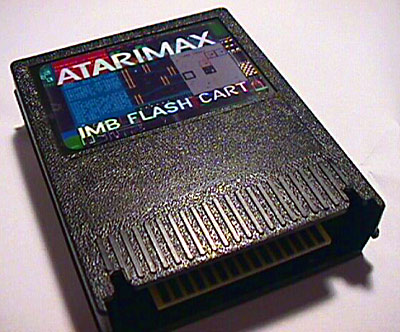 Having a tape drive, disk drive or hard drive to save and store programs has helped the 8 bit computers. Even after the systems were declared dead, garners and game companies continued to make more new disk-based games for them.
Having a tape drive, disk drive or hard drive to save and store programs has helped the 8 bit computers. Even after the systems were declared dead, garners and game companies continued to make more new disk-based games for them.
There was a gradual decrease in new games for the 8-bits. There is also emulation and new hardware tools that allow one to transfer games from ROMs to real floppy disks and back. But it is a whole different ball game when there are five thousand games on floppy disks systems compared to fifty or five hundred games for a cartridge based system. The thrill is still there, but not quite the same as holding a brand new game cartridge in your hand and plugging it in to play.
While it is unlikely that we'll ever see any multicarts or copied carts for the classic computers, if someone did make them, there would be folks like me out there to buy them. Can you imagine a 5,000 game multi-cart for the Commodore 64, Atari 8OOXL, or TI-99? [Ok, this article isn't that old, but http://www.sunmark.com/ now has 8-bit Multicarts! - Ed]
ROM images, new, homebrew or copies of games, new hardware other enhancements can now be found on all of these systems: Atari 2600, 5200, 7800, Intellivision, Colecovision, Astrocade, Vectrex and Odyssey 2. There are too many to mention them all but many of them can be found on the Classics title page on this website.
Just about every console has been tapped into significantly and will continue to see their libraries expanded as they push these classic systems to their limits. I hope this brief article has opened your eyes a bit to the growing world of new releases for our favorite classic consoles. I applaud the homebrew authors for their efforts and hope that you will do the same.
Now, can someone please make me a two-player, four-joystick version of Robotron 2084?!
- Alan Hewston
Sr. Writer of Retrogaming Times http://tomheroes.com/
| Name: | |
| Subject: | |
| Comment: | |
| Check: | What is the greatest video game company of all time? (Hint: Atari.) |